Blog Archives
‘Stereophonic,’ Adjmi’s Hit Transfers to Broadway
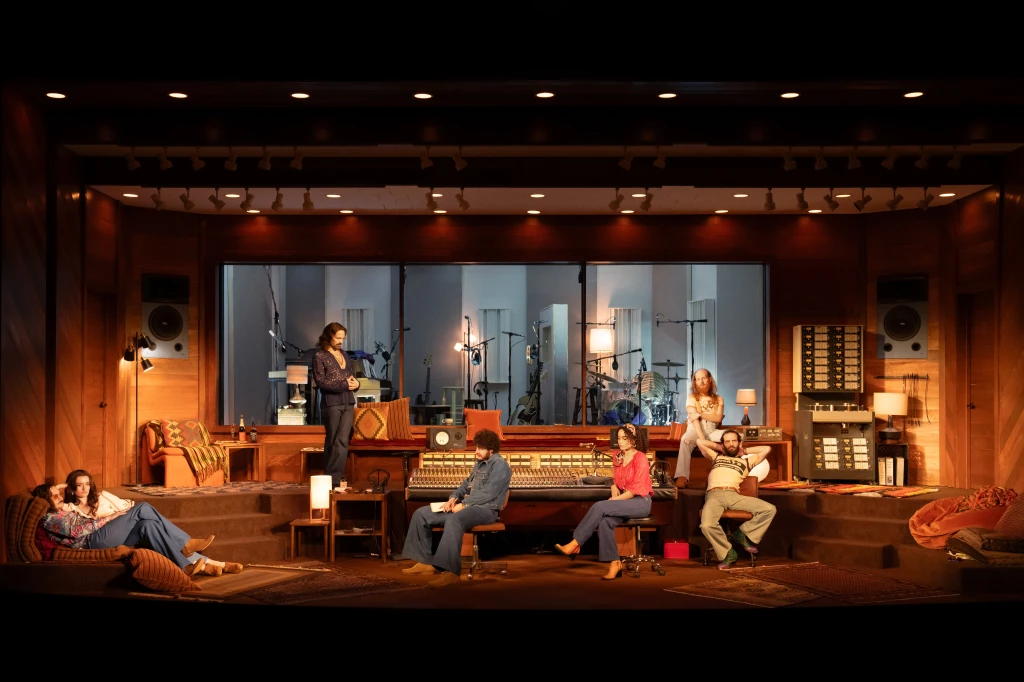
When Stereophonic opened at Playwright’s Horizons in the fall of 2023, the hybrid comedy/drama/musical was extended a number of times for a multitude of reasons. The acting was superb. The subject matter intrigued. Who is not enthralled by a smooth rock band on the cusp of greatness with a chonky financial contract, “getting their s%$t together,” as a small privileged audience watches them record their artistry in two sound studios? Under pressure, the two couple’s relationships straining, the husband-wife partners display pustules bursting with emotionalism, and the audience sees the interior of these relationships. What’s not to love?
This is live theater at its best. The audience lives moment to moment with the musicians (we have forgotten they are actors), riding to the mountain tops and canyons as we joy to their pain of creation, producing what may be a #1 album that soars to the top of the charts. In its transfer and Broadway premiere at the Golden Theatre, the cast, music, verité style, and arc of development are the same as is the three-hour length as in the original production at Primary Stages. Bravo. It is still a must-see.
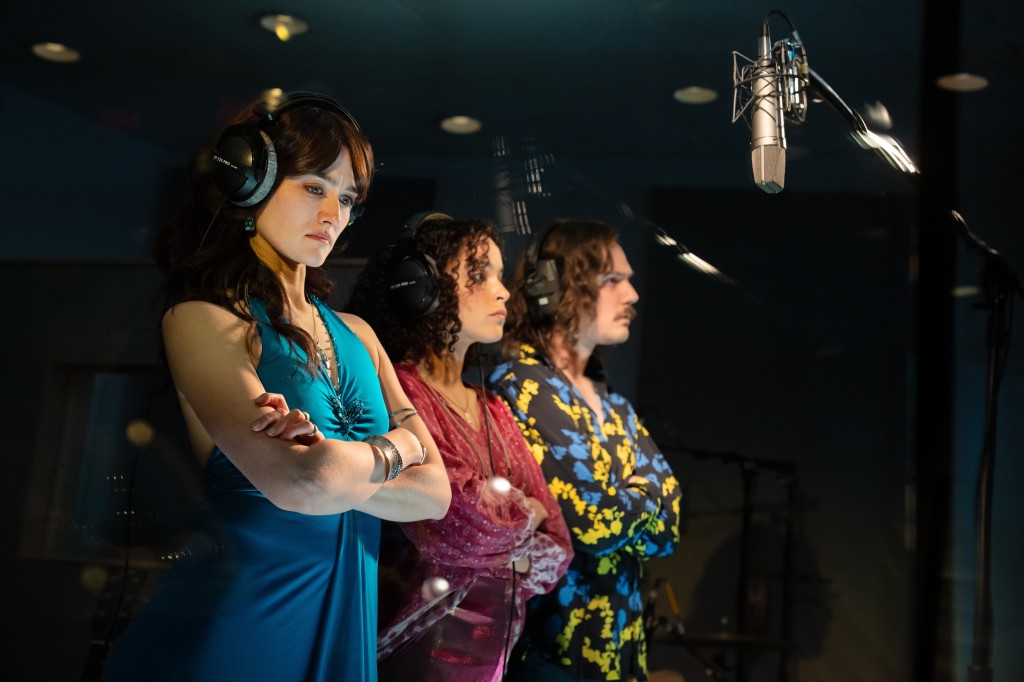
Why would playwright David Adjmi (The Evildoers, Stunning), Will Butler, who wrote the terrific original music and lyrics, and superb director Daniel Aukin muck with success? The solid, winning substance of Stereophonic is about the five-member rock band and studio engineers working at an accelerated pace to record an album at two California sound studios in the mid-1970s. We get the “low-down” perspective of what it takes to be great.
Above all Stereophonic Broadway remains a stylistic masterpiece of theater verité with a view into two separate worlds, music creation and technical engineering, without which musicianship would not exist. The meld of the two in a great album reveals the dynamic genius of technicians and musicians, though the musicians are the public face who receive all the glory.
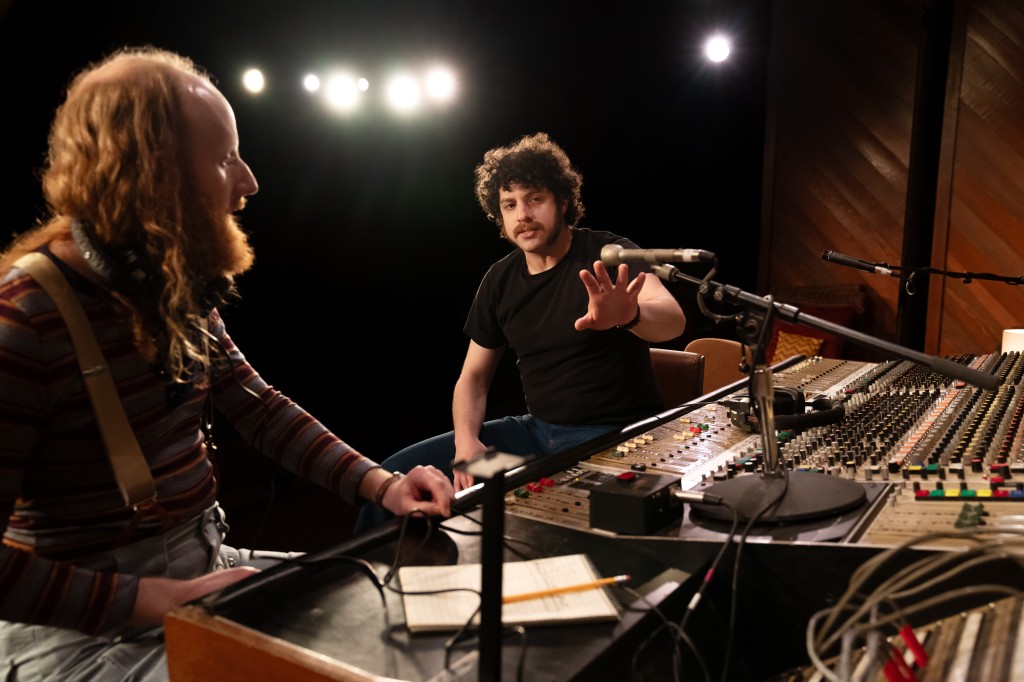
Two points to make about the production, which is integrated and fantastic from my perspective, with one suggestion. First, Stereophonic may not be understood by a “Broadway” type audience, who might not have the patience to work through the incredible detail of “moment to moment” dialogue and complications so organically constructed, intimate and authentic, that the realistic action brings one into oneself, rather than encouraging escapism in a flight of song and dance numbers characteristic of “the Broadway show.” In its brilliance, Stereophonic may not be fully appreciated for what it is. Stereophonic is a “one-of-a-kind” original that provides an electrifying evening of music creation as one would imagine happened in iconic recording studios like Muscle Shoals Sound Studio in Alabama or Abbey Road in London, perhaps, without the histrionics.
Secondly, in its staging at the Golden Theatre, a larger venue, the sound design has to be properly figured out by the designers, and the actors. They are not in a smaller venue. The actors must project, especially when their backs are turned from the audience. The sound design must be at equal level in every portion of the theater to eliminate dead spots. In the transitioning this must continue to be fine tuned.
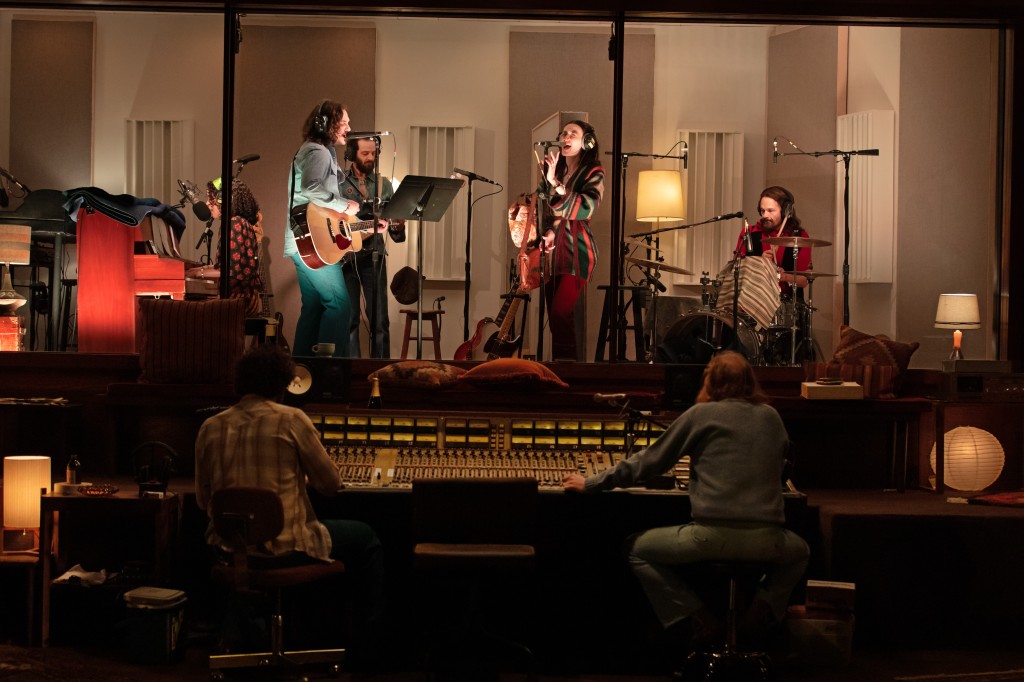
For rock fans and those fascinated by the ethereal nature of how bands collaborate, the Broadway production mesmerizes because we clearly understand the division between the musicians’ mystical artistry, which is always front and center, and the unseen, faceless, backstage engineering by Grover (Eli Gelb), and Charlie (Andrew R. Butler), who are finally revealed in process. It is the engineers’ artful techniques which enhance the overall effect and impact of each recorded song. This division of the two different realms of making music is beautifully manifested in David Zinn’s wood paneled scenic design, and Jiyoun Chang’s lighting design, which Aukin carried over to Broadway, along with Enver Chakartash’s period costume design. Robert Pickens & Katie Gell’s hair and wig design are new in this production.
As at Primary Stages, the Golden Theatre’s stage is divided into two sections. The upper level reveals the sound studio protected by glass, where we see and hear the musicians perform in a theater verité style, as they stop to revise tempos, add pauses, evolve riffs, etc. Downstage is the massive control panel where the engineers sit mostly with their backs to the audience and work to serve, manipulate, and stoke the musicians’ extraordinary talent and heightened emotional states, all the while discussing “their truth” with each other. With Aukin’s superior staging, we can track both worlds, feeling we are in their midst, interactively participating in music creation and understanding how the worlds precariously interact.
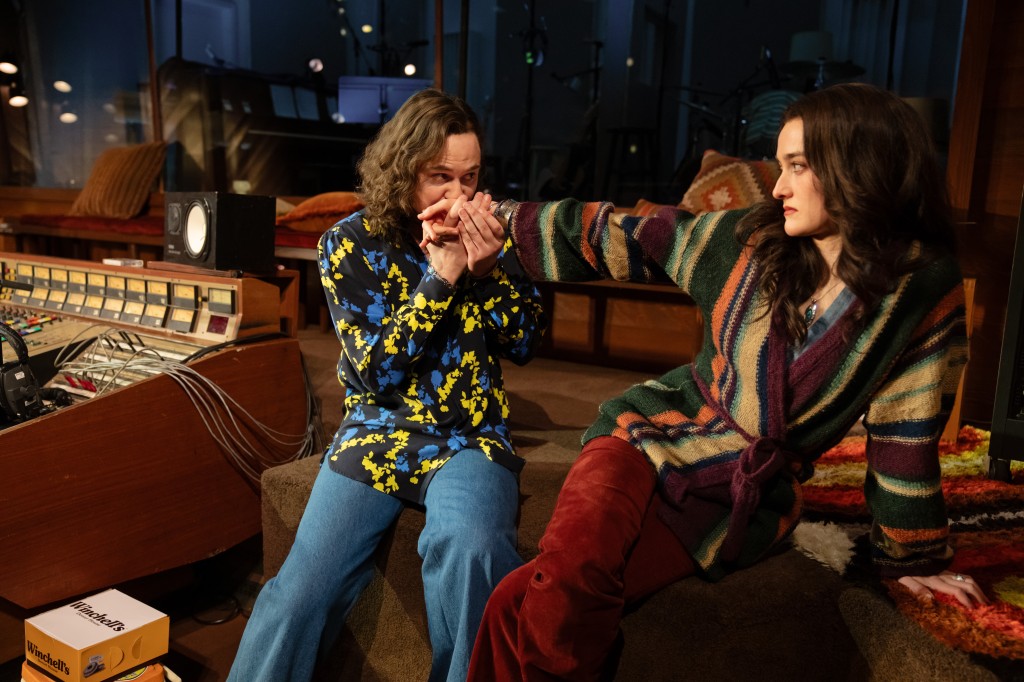
Though band members treat Grover and especially the shy Charlie as invisibles they don’t speak to, without their efforts the band’s unique identity and glorious sound wouldn’t exist. Therefore, in the production’s arc of development, Adjmi gradually uncovers the engineers’ centrality to the creative process and the band’s success. It is especially funny and poignant to witness how the engineers moderate the emotional infantilism of the “high-strung” musicians to get the recordings in top shape.
Throughout, drugs and alcohol become a panacea to quell the rough edges of sleep deprivation and stimulate a frenzied work environment. The cocaine, supplied by overworked engineers, keeps the band working at a frenetic pace. Ironically, drug use intensifies the arguments but floods the band’s creative juices.
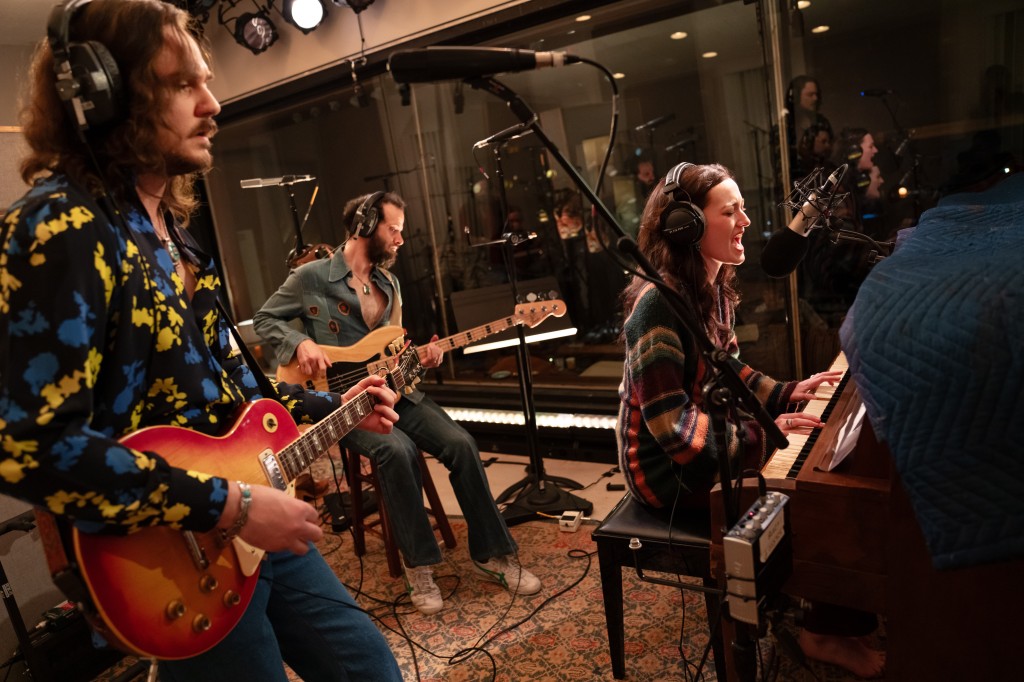
Aukin’s vision of Adjmi’s themes of art, music, sacrifice and suffering, heighten the importance of sound engineers. They must have skill and expertise in the control room, as well as the personalities to cope with and manipulate artistic personas like druggy Reg (the hysterical and funny Will Brill), and diva Diana (Sarah Pidgeon).
For example Grover and Charlie must be temperate as Diana strains to get the notes, emotionally loses it, and must be encouraged by her partner lead musician and producer Peter (Tom Pecinka), to try again and again to “get it right.” Additionally, the engineers must be purposed to withstand the emotional word bludgeons from their “boss,” Peter, who launches off into a demeaning tirade against Grover and fires him. It is an idiotic move because Grover is the backbone of the album and Peter knows it. That is why he later makes Grover co-producer and apologizes.
The songs of Will Butler, (Oscar-nominated and former member of the Grammy-winning indie rock band Arcade Fire), remain as striking as ever. Indeed, one would wish that this band does produce an album, finishing the partial songs (we only hear a few in their entirety), that we hear them rehearse. The songs resonate with the themes of emotional yearning and the deceptions of fame, money and commercialism, the masquerade that they must avoid. If they embrace the commercialism, they will lose their way as artists, attempting to achieve perfection, a goal of the hard driving Peter.
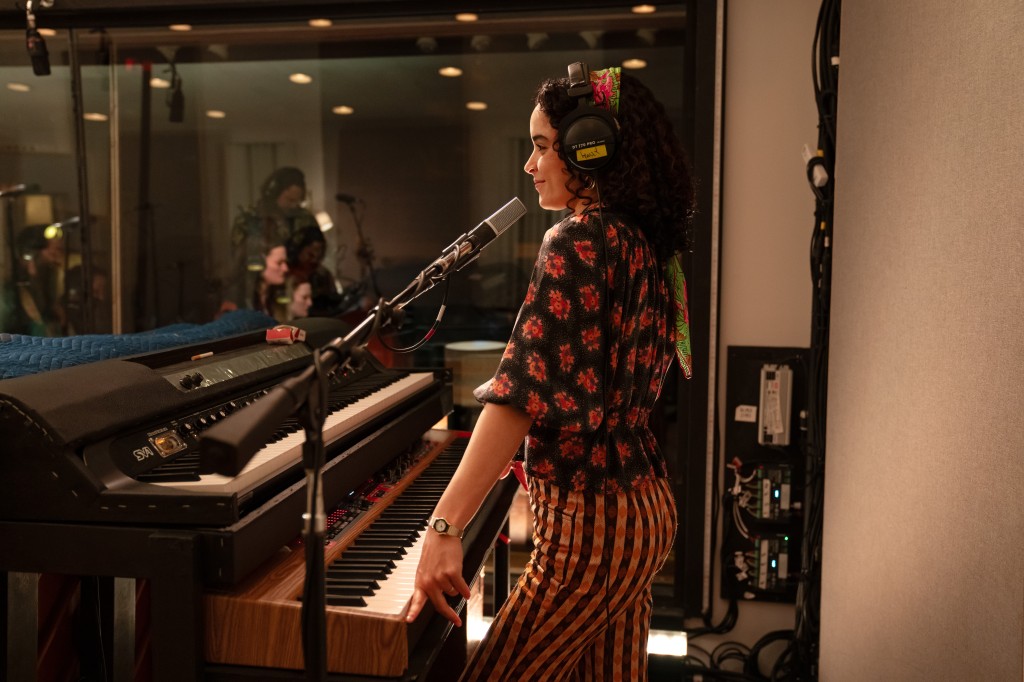
Butler’s songs importantly reveal the raw emotions of anger and hurt, stirred by betrayal and loss that couples Reg (Will Brill) and Holly (Juliana Canfield), and Peter and Diana, experience in their relationships. Working frenetically together in close quarters to exceed the results of their previous album require sacrifice to be great. Peter constantly pushes them toward this. But by the conclusion as their work is finished, all have suffered for it. Simon (Chris Stack), who has been away from his wife and children for six months faces the threat of divorce and losing his family.
However, only Diana has been signed on to be a solo artist. Is the pain, suffering and sacrifice worth it for the others? Juliana Canfield’s Holly, a close friend and ally of Diana, congratulates her on this success. But we are left wondering if they will remain close or if the band will remain together to collaborate again?
A tour de force, Stereophonic runs over three hours with one intermission. Thanks to Adjmi, director Daniel Aukin, the sensational cast, whose acting chops and vocal talents are non-pareil, and the technical design team, the compelling forward momentum of the band’s creative dynamic resonates with powerful immediacy.
Special kudos goes to Music Director Justin Craig and Will Butler and Justin Craig’s orchestrations.
Stereophonic runs through July 7 at the Golden Theatre (252 West 45th Street, between Broadway and Eighth Avenue). www.stereophonicplay.com
Theater Review (NYC Off-Broadway): ‘Apologia’ by Alexi Kaye Campbell, Starring Stockard Channing, Hugh Dancy

(L to r): Hugh Dancy, Talene Monahon, Stockard Channing, ‘Apologia,’ Alexi Kaye Campbell (Joan Marcus)
Apologia by Alexi Kaye Campbell poses the question: At what point must women decide between their families and their careers? Why do they have to? Should family members judge them for making their own individual choices? Must they always sacrifice their own identities to the happiness of husbands, sons? Would men in the same position subvert their own happiness allowing their wives to self-actualize without them?
Apologia, starring Stockard Channing as American art historian and human rights activist Kristin Miller in a riveting performance that spellbinds with truth and power, answers some of these questions. Playing both of Kristin’s sons, Peter and Simon, Hugh Dancy provides a tremendously potent assist as the initial backboard for Kristin’s edgy, ironic sarcasm. And then he doesn’t, in a turn which startles and leaves one breathless. Along with Talene Monahon’s deeply nuanced and empathetic Trudi, the twists of the evening and Trudi’s last comment lead Kristin on a long-awaited journey toward an acknowledged and necessary expiation.
Directed ably by Daniel Aukin, the Roundabout production is presented in special arrangement with Trafalgar Entertainment group, DB Productions, and The Dodgers. The themes scale up to the mountains women continually climb. However, each woman’s specific experience, though easily generalized, brings out unique circumstances. Such is true for Kristin Miller and her family.
Forty years ago, when Kristin Miller had her sons, feminists’ efforts to shatter the glass ceilings were faltering. Over the decades women found that “having it all” exhausted them, because they didn’t actually “have it all.” The differences loomed, as they still do, between men’s and women’s efforts to create success. And what of those women who forge ahead only to confront the ire and snide glances of men, family, and other women? Like Kristin, realizing they have to go it alone, these mavericks harden their souls because they must.
Thus, only the sound of their own ironic understanding resonates within. And gradually their rough edges blossom forming steely, stolid personalities. Such tough, determined women become renowned for their achievements. This life path sustains Kristin over the decades, supported by friends, through socio-political events and sometimes family gatherings. And then –
On the evening the action begins, her family and a friend visit for dinner and her birthday, bearing gifts. It’s the spring of 2009 in the UK, and the world wide economy is attempting to recover from the mortgage debacle which her son Peter, a congenial banker, may have helped preside over.
During the birthday celebration, we discover an intriguing antithesis. When Kristin’s marriage failed, her husband left. But he didn’t leave her for another woman. Instead, he left her bereft, took the children without a discussion, and divorced her. She could see her songs only on holidays. Irony of ironies, he left despite their shared values and mutual respect. With all of that, he still couldn’t tolerate her gaining her own voice.

Stockard Channing in ‘Apologia’ directed by Daniel Aukin, written by Alexi Kaye Campbell (Joan Marcus)
In speaking truth to power, sparking her own personal revolution through discovering the maverick Renaissance painter Giotto’s revolution, Kristin soared. And while she moved progressively upward, her husband felt abandoned. In turn, he abandoned her without notice. She stood strong against the winds, but we learn that this abandonment and betrayal changed all of their lives forever.
In an illuminating performance, Channing portrays Kristin Miller as one of the culture’s more steadfast moral compasses. We appreciate her acute sensitivity and wit when she calls her party guests on the carpet with reasonable arguments. For example, she elevates Simon’s girlfriend Claire (the wonderful Megalyn Echikunwoke) for her acting talents, shown as she plays an innovative Nora in Ibsen’s A Doll’s House. On the other hand she calls her down when Claire refers to her soap opera acting job as “artistic.” And she ironically roots out from Claire that she paid over 2,000 pounds for a designer dress because she “deserved it.” Friend Hugh (the humorous, well paced John Tillinger) finds such an amount for a dress nearly obscene. So does Kristin, a communist and activist who attends protests with great hope and fervor.

(L to R): Megalyn Echikunwoke, John Tillinger, Talene Monahon, Hugh Dancy, Stockard Channing, ‘Apologia, by Alexi Kaye Campbell, directed by Daniel Aukin (Joan Marcus)
As the play progresses we acknowledge Kristin’s outer invulnerability and searing, humorous acerbity. The guests circle around her with care. Only her longtime friend Hugh understands. And he praises her and defends her as they discuss their fun past filled with war protests and marches. However, once in a while, Talene Monahon’s Trudi pings a chip in Kristin’s protective shell. As simplistic and washed out as Kristin would make Trudi out to be, we realize this is a blind. Indeed, the information Trudi has gleaned from Peter’s discussion of his mother has stirred Trudi with insight. And the wisdom she gained Trudi drives like an arrow through Kristin’s hardness into the depths of her softening heart.
In this ominous time when Kristin first meets Trudi, a transformation occurs. Trudi brings an intriguing present which has great symbolic significance, initially unknown to all. Kristin looks up its description and identifies its purpose and meaning. Assuredly, Trudi has chosen this gift with intuition, as it fits who Kristin represents. However, the revelation occurs after Simon’s momentous visit and departure. Dancy’s portrayal of Peter’s brother Simon rings with a poetic, stark emptiness that breaks Kristin’s heart though she doesn’t readily show it. Channing’s subtle portrayal implies her inner brokenness with Simon. The actors mesmerize us in this scene.
As the lighting design indicates, Simon’s being remains in the shadows. Though his mother tenderly attempts to bind his wounds from a fall, she succeeds only with the physical flesh. Instantly, we realize this ministration of wrapping Simon’s wounds symbolizes a greater action on her part.
Kristin cannot bind the emotional lacerations he experienced when the family split up. Not completely understanding what happened between his parents, Simon doesn’t know why she never came for his brother and him. But he takes a small step in realizing that his current feelings reflect reactions from the past about her. This realization comes because Kristin doesn’t refer to her two sons as part of her “life and times” in her memoir that has just been published. Indeed, both Peter and Simon must acknowledge Kristin’s identity as separate from theirs, yet a part of them. Finally, they must stop blaming her and take responsibility for their own baleful choices.
Will Simon ever understand that Kristin, in pursuing her own identity and self-validation, benefited him? Crickets for now; maybe not in the future. Though Simon leaves with a stain on his heart, perhaps the door has opened a crack to let in more light. He decides to finalize his relationship with Claire. Indeed, this evening of understanding may portend a new beginning in Kristin’s and Simon’s relationship.

Hugh Dancy in ‘Apologia’ (Joan Marcus)
Though Kristin’s evening celebration went through its own thunder and lightning storm, the light of day shines on each of the guests. Peter apologizes. And Kristin apologizes to him. Her hard, humorous, sardonic protections appear to soften. Suppressed emotions pour out and the air clears. However, whether this result will move the sons in a finer direction of empathy toward their mother, Campbell leaves open.
Thankfully, hope appears on the horizon in the profound shape of Peter’s Christian fiancée, Trudi, who may really be what Christians are supposed to be, loving and understanding. Incredibly, Campbell cleverly sneaks this in without fanfare.
Campbell’s work shepherded by the director and actors subtly draws us into this family evening that flows with deep undercurrents. The actors are splendid together and the lighting and music segues us into the soulful levels of the characters’ hearts. I particularly love the play’s concept of “apologia,” the noun meaning vindication, justification, explanation. For both of the sons and Kristin, there is an apologia. Of course none needs it more than Kristin. But it is Trudi who triggers Kristin’s finally laying down her defense, justification, explanation to others. For she must set her own forgiveness in motion for herself. At the end Channing’s cry is one of beauty, sorrow, grace, and at bottom, the courage to let go. Wonderful.
Kudos to Dane Laffrey (set design), Anita Yavich (costume design), Bradley King (lighting design), Ryan Rumery (original music and sound design). The premiere of APOLOGIA is at the Laura Pels Theatre in the Harold and Miriam Steinberg Center for Theatre (111 West 46 Street). It runs through 16 December. Visit the website for tickets.